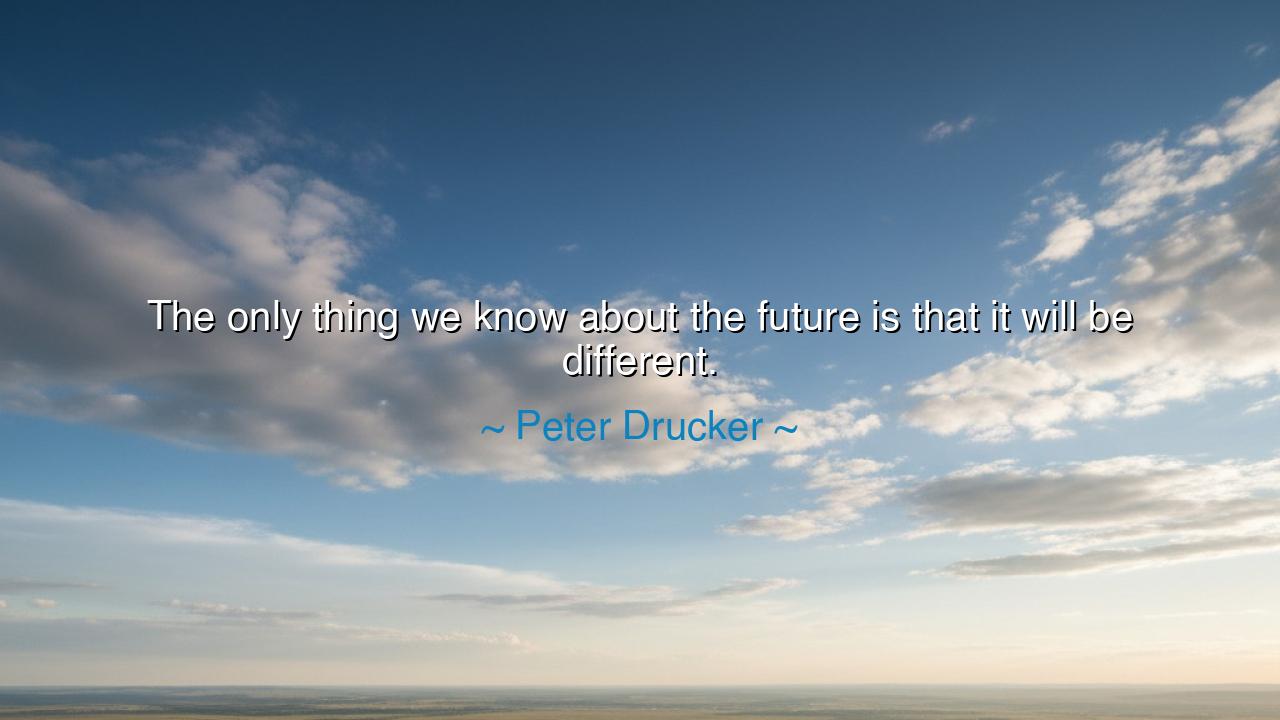
The only thing we know about the future is that it will be






Peter Drucker speaks to the very heart of the human condition with his words: "The only thing we know about the future is that it will be different." These words ring with the wisdom of the ancients, as they remind us of a timeless truth—that the future is an unknown land, a place where we must tread with both courage and humility. No matter how much we seek to predict or control it, the future will always be a realm of change, of transformation, and of uncertainty.
To gaze upon the future, as the philosopher kings did, is to behold a vast and ever-shifting landscape. The ancients understood this well. The great empires of old—be they the Persian Empire or the Roman Empire—were once unshakable, mighty in their glory, yet they too succumbed to the inevitable forces of change. From the smallest of tribes to the greatest of civilizations, all are swept by the currents of time. In their rise and fall, they remind us that no power is immune to the force of change, and the only certainty in life is that everything will evolve.
Let us reflect on the fate of Alexander the Great. A man who seemed destined to rule the world, he marched across continents, leaving a legacy of military conquest and empire-building. Yet, after his untimely death, his vast empire fractured and was divided among his generals. What had been certain in his lifetime—his unquestioned dominance—became a fragmented and unstable reality. The future, as Drucker implies, had already begun to shift, and no force, not even the might of Alexander, could halt its inevitable course. Change, even when we resist it, arrives, as a silent tide that alters the landscape.
Consider also the transformation of the industrial world. Once, the factories of the 18th and 19th centuries were the beating heart of human progress, and the steam engine symbolized the power of innovation. But then came the technological revolution. Machines that once seemed impossible were surpassed by computers, and the digital age emerged, redefining how we live, work, and communicate. Those who embraced change were able to harness its power; those who resisted it were swept aside. Drucker’s wisdom speaks here too: the future is born of transformation—it cannot be avoided, only shaped.
The lesson, then, is that we must embrace the inevitable flow of change. We must not cling to the familiar, nor resist the progress that calls us forward. Drucker reminds us that while we cannot foresee the future in its fullness, we can recognize its unstoppable nature. The wise are those who are not fearful of change but who adapt to it. Like the river that shapes the land, change will carve a new path. To be swept along with it or to fight it both present their own consequences. Those who prepare for the unknown are the ones who shall thrive.
In our own lives, we must not be content to live in the present, nor to long only for the past. Let us, instead, take up the challenge to shape our future by remaining open to change, to innovation, and to new opportunities. The future, though unknown, can be molded by our actions, our decisions, and our willingness to embrace that which is to come. Do not fear what will be different; rather, seek to be the one who shapes that difference with purpose and wisdom.
Therefore, the lesson is clear: change is inevitable. The future will come, and it will be different from the present. We must not only accept this, but we must embrace it with the understanding that it is in change that growth lies. Like the great civilizations of old, we too must be ready to adapt, to evolve, and to become something greater than we are today. For it is only by accepting the changing currents of time that we can hope to ride them to success and fulfillment. The future is for those who are not afraid to embrace it.






AAdministratorAdministrator
Welcome, honored guests. Please leave a comment, we will respond soon